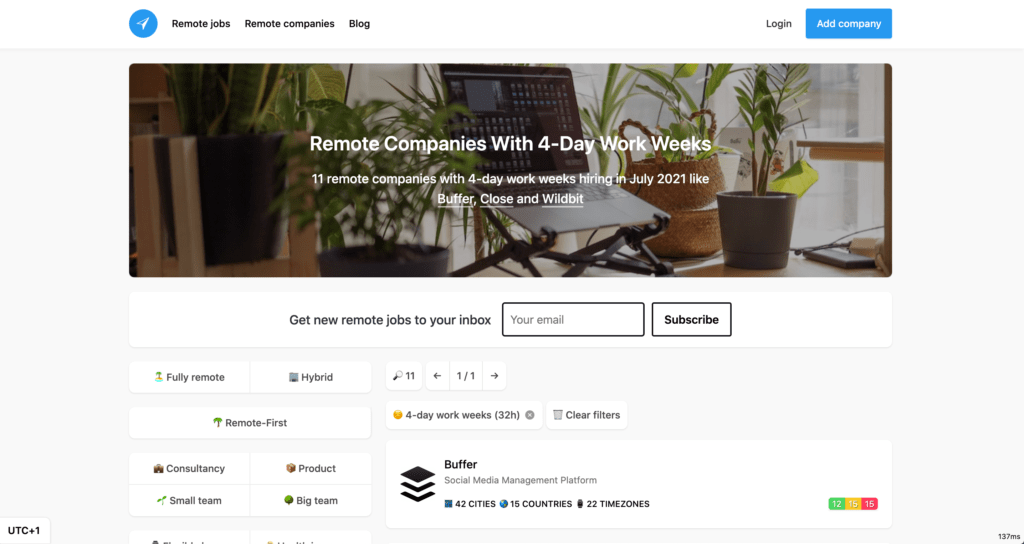
Many tech firms have been trialling a 4-day work week whilst increasing remote working and part-time opportunities… or at least these ideas are firing off. With businesses like Buffer, Wildbit and Close this new way of working has already begun but how sustainable is it?
The rippling effect of COVID-19 across every single element of our lives have been truly horrific. At the same time, COVID-19 has created a huge cultural shift for the white-collared office workers as many businesses finally realise the potentials of remote working as well as the importance of raising awareness of mental health in the workplace.
Who knows which start-up started up this trend but what we do know is a lot of businesses are trialling this 4-day work week. As Kickstarter plans to test out the waters next year, CNBC predicts that this trend will kick off as the rest of the industry follow suit. With so many growing sick of the grind of work, stuck at home with a lot of time to reflect, a lot have quit their jobs to focus on their personal endeavours and to just take that long-awaited career break they’ve been putting off for years. Many businesses are now trialling different solutions and maxing out their mental wellbeing budgets to keep their staff motivated, happy and…most importantly to retain their workforce. With many still dreaming of more time off, more flexibility and their lives back as COVID-19 restrictions loosen it’s no wonder the 4-day work week is hitting off the headlines.
Despite these new work-life balance adjustments happening all over the City many are sceptic of these 4-day promises saying in order to cut down days workers may need to work longer hours.
I would gladly work four ten-hour days for a long weekend every week.
— rusty shackleford (@mack24x7) July 6, 2021
Perhaps businesses will have different approaches in order to adapt to this new forward way of work-life.
What are the benefits of a 4-Day Work Week?
Increased Productivity
Who knew working less could increase work productivity. Sanford University conducted an experiment that revealed overworked employees are actually less productive than employees working the average 5 day work week. This New Zealand based company also conducted a trial study of a 4 day work week and found its employees happier, less stressed and more able to focus whilst maintaining the same productivity level. It seems that the results all say the same thing: if working less contributes to a happier employee then in return they may actually do more work.
An Equal Workplace
This Research on Gender Pay Gap shows that roughly two million people in the UK are unemployed due to childcare responsibilities and 89% of these people are women. A 4 day work week could promote an equal workplace as employees would be able to juggle work commitments and time with their families.
Better Employee Engagement
A 4 day week can lead to happier and more engaged employees. A number of shorter workweek trials are now being run across the world, including in Spain and by Unilever in New Zealand following the world’s largest-ever trial 4 day work week led by Iceland’s Reykjavík City Council which proved a “huge success”. The 4-year trial that started in 2015 included more than 2,500 workers who moved from 40hrs a week down to around 35hrs. The results proved shorter workdays made employees happier and less stressed which resulted in increased engagement. Decreasing work hours and increasing time for family, hobbies, home chores or whatever contributes to better wellbeing can make better employees due to their personal needs being met.
A Smaller Carbon Footprint
Working less is proven to reduce our carbon footprint and having shorter workweeks could save the Earth.
Countries with shorter working hours typically have a smaller carbon footprint so reducing our workweek from 5 to 4 days could have an environmental benefit.
A trial was done in Utah that reduced the average workweek from 5 to 4 days showed that over US$1.8m in energy costs were saved; this included a reduction of at least 6,000 metric tons of CO2 emissions during the first ten months. And that was just from closing the office building on Fridays. If commuters were also included it was estimated to save the CO2 emissions which is equivalent to 2,300 cars off the road in one year. Think about how much could be saved if this trial was rolled out to the rest of the world to just work 1 day less.
Businesses That Adopt the 4-Day Work-Week
If you’re wondering what businesses are adopting this new 4-day work week then there have already been many on the case. Here’s a list of the places you can find 4 day work week jobs.
@philostar from Twitter has created this app 4 Day Work Week that scrapes 4-day work week jobs and sends them directly to your inbox.

RemoteHunt has a 4-day work week remote job search page.

Wildbit have created this Airtable list of 4-day work week that even knows which day those employees get off. On closer inspection, some of these businesses adopted the 4DWW from as far as 2015!

As our habits have changed over the year from being cooped up in our cosy flats an organisation’s ability to learn, and rapidly translate that learning into action has become a competitive advantage. Zoom Yoga on a Tuesday night no longer surfaces. The fact work has merged into our sleeping spaces has been both a miracle yet a curse. The benefits of flexible working have been too good to leave behind. When the world starts piecing itself back together perhaps some businesses will adopt this new work week, perhaps others will muster their own solutions, perhaps nothing will come of it. Who knows…but I definitely know how I want to be working.
How have your employers been listening to your needs? Get in touch we’d love to know more!
